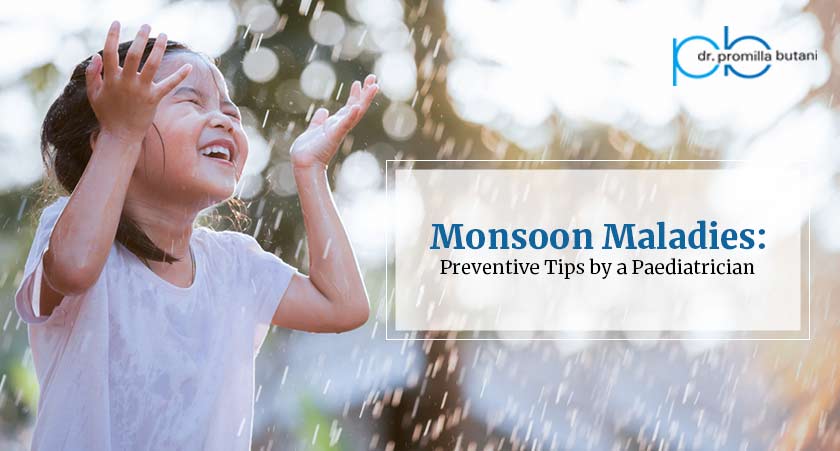Monsoon gives relief from intense summer heat with welcome rain but with rain come the monsoon blues and maladies.
1. MOSQUITOES AND VECTOR BORNE DISEASES
A. Malaria
B. Dengue
C. Chikungunya
D. Japanese encephalitis
E. Leptospirosis
F. Scrub typhus
2. VIRAL RESPIRATORY INFECTIONS
3. WATER AND FOOD BORNE DISEASES
A. Viral and bacterial gastroenteritis
B. Amoebic giardia infection
C. Viral hepatitis A & E
D. Typhoid and Paratyphoid fever
E. Cholera
1. PREVENTION OF MOSQUITO AND VECTOR BORNE DISEASES
NO VACCINES AVAILABLE AS OF NOW FOR MALARIA, DENGUE, CHIKUNGUNYA, LEPTO SPIROSIS AND SCRUB TYPHUS AND FILARIA.
VACCINES FOR JAPANESE ENCEPHALITIS available for children above the age of 1 year in two doses (one month apart)
Prevention is the mainstay in management of mosquito/vector borne diseases.
– Preventing pooling of stagnant water
– Desilting of drains
– Fogging
– Change water in flower vases,coolers every week .
– Avoid using saucers underneath flower pots.
– Cover water containers, overhead tanks tightly
– Cans, bottles, tyres in covered dustbins
– Treat water in flood like situations
– Mesh doors/ windows in homes and use of mosquito nets wherever required
On a personal level
– Wear light colored long sleeved shirts and trousers to prevent being bitten by mosquitoes.
– Use of insect repellents on exposed areas.
– Mosquito repellents of limited value/ use. They are available as liquid plug ons, roll ons, creams and sprays.
2. PREVENTION OF VIRAL RESPIRATORY INFECTIONS
Humid, sultry weather creates ideal conditions for respiratory viruses to thrive.
Flu Vaccine needs to be taken every year around this time of the year.
This is specially important for the very old, the very young, the immune compromised and also the people with asthma, allergies and frequent respiratory infections.
In fact, it can be taken routinely by everybody.
On a personal level
– Keep nose and face covered during sneezing and coughing.
– Keeping tissues and handkerchiefs separate.
– The virus spreads quickly and easily from one person to another so interpersonal hygiene is very important.
– Frequent hand washing with soap and water.
Since there is no cure for viral respiratory illnesses supportive treatment includes:
– Drink plenty of fluids to stay hydrated.
– NO ROLE OF ANTIBIOTICS, ANTIALLERGICS/ ANTIHISTAMINES.
– STEAM inhalation and saline gargles help.
– Paracetamol in age/ weight appropriate doses every four-six hours if temperature is 100 deg F or more.
– REST AT HOME !
3. GASTRO-INTESTINAL INFECTIONS AND INFESTATIONS
These are all WATER AND FOOD BORNE DISEASES — SPREAD BY THE OROFECAL ROUTE- wherever and whenever there is a break in public/ personal hygiene.
The diseases include:
1. Gastroenteritis- diarrhoea and vomiting
– Viral
– Bacterial
– Amoebic or Giardia
2. Jaundice or hepatitis A and E
3.Typhoid and Paratyphoid fever
4.Cholera
Vaccines preventable diseases include :
– Hepatitis A
The vaccine is given in two doses, six months apart to everybody after the age of one year.
– Typhoid vaccine
Typhoid conjugate vaccine can be given to all age groups above the age of one year. It needs to be repeated every two-three years once or twice for long lasting immunity.
– Cholera vaccine
It is to be administered only in epidemic or flood like conditions.
PREVENTION:
Good personal hygiene
Hand and Nail hygiene
– Thorough hand washing with soap and water after using the toilet, or after handling a patient with diarrhoea.
– Hand washing before cooking/ making feed for children.
– Hand-washing after handling animals
– Cut hand nails to be the base to prevent the dirt from accumulating under the nail beds.
Food safety precautions include:
– Washing and peeling of all raw food and vegetables before eating.
– Wash hands before handling food.
– Avoid cut fruits, fresh fruit and sugarcane juices from outside/ street vendors.
– Avoid street food.
– Avoid food with milk products, food with cream and mayonnaise or chutneys from outside.
– Eat at clean eateries.
– Drink only properly treated/ bottled water when out in public places.
– Do not drink untreated water from street vendors, ponds or streams.
– Do not swallow water while swimming
Enjoy the monsoon with all these precautions/Dos and Don’ts!
